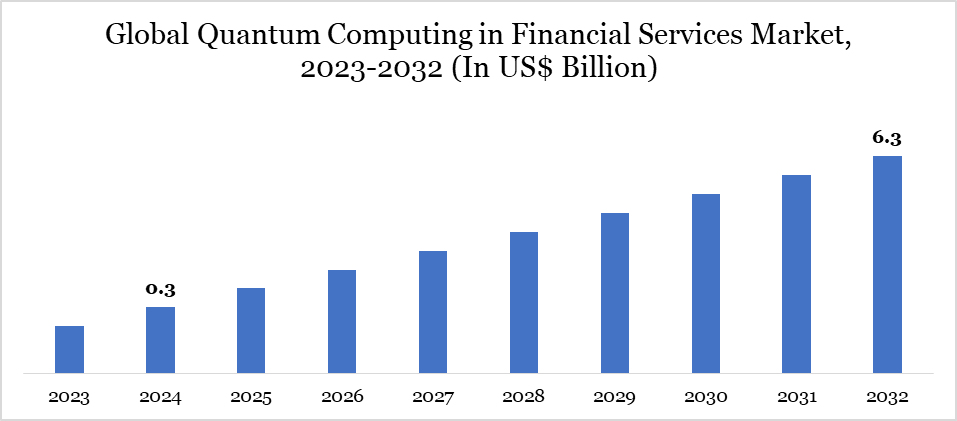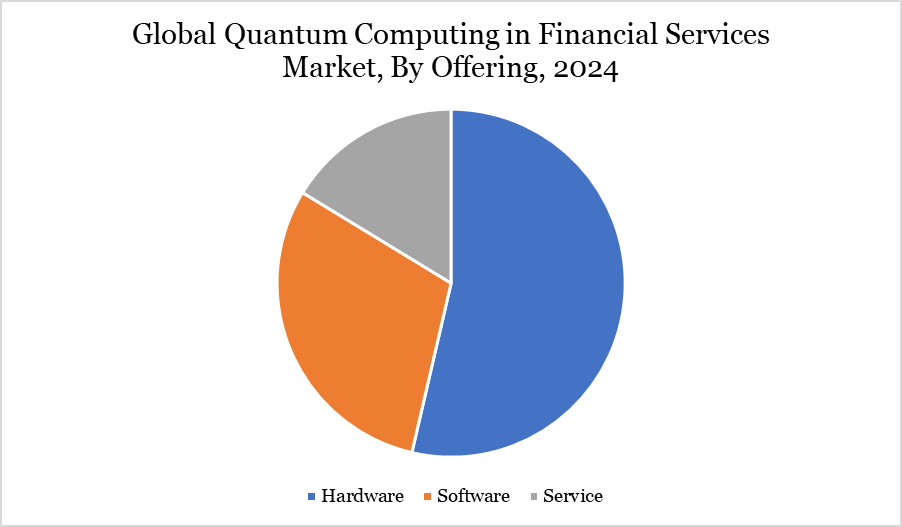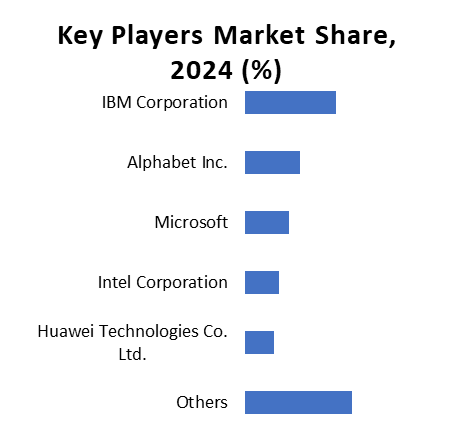Market Size
Global Quantum Computing in Financial Services Market reached US$ 0.3 billion in 2024 and is expected to reach US$ 6.3 billion by 2032, growing with a CAGR of 46.5% during the forecast period 2025-2032.
The age of quantum computing is fast arriving and the financial services industry should prepare accordingly. Increased capital investments and patent applications for hardware technology indicate that spending on quantum-related capabilities is anticipated to increase rapidly in the next years. Quantum computers can do calculations at speeds unfathomable for classical systems. This capacity allows for speedy decision-making in high-frequency trading environments where milliseconds count, giving early adopters a competitive advantage.
Several financial institutions are already investigating the possibilities of quantum computing. Goldman Sachs has teamed with Amazon Web Services (AWS) to examine how quantum solutions might improve derivative pricing and portfolio optimization. These projects aim to increase efficiency and profitability.
Furthermore, HSBC is working with IBM to investigate operational efficiency using quantum algorithms, with an emphasis on risk management, fraud detection and regulatory compliance. This collaboration demonstrates the growing convergence between financial institutions and tech titans.

For more details on this report, Request for Sample
Market Scope
| Metrics | Details | |
| By Offering | Hardware, Software, Services | |
| By Deployment Type | On-premises, Cloud-based | |
| By Technology | Quantum Dots, Trapped Ions, Quantum Annealing | |
| By Application | Corporate Banking, Risk & Cybersecurity, Retail Banking, Payments, Asset & Wealth Management, Investment Banking, Others | |
| By Region | North America, South America, Europe, Asia-Pacific, Middle East and Africa | |
| Report Insights Covered | Competitive Landscape Analysis, Company Profile Analysis, Market Size, Share, Growth |
Market Dynamics
Advancements in Superconducting Qubits
One of the primary drivers of quantum computing hardware adoption in financial services is the rapid progress of superconducting qubit technology, which allows for quicker and more efficient quantum computations. Superconducting qubits, which are employed by businesses such as IBM, Google and Rigetti Computing, are becoming more stable, with better error correction mechanisms and longer coherence durations, making them more suitable for complicated financial modeling.
For example, IBM's Eagle processor (127 qubits) and Osprey (433 qubits) have shown considerable gains in computational capacity, allowing financial firms to execute quantum simulations for risk assessment, portfolio optimization and fraud detection more effectively. As these improvements continue, financial organizations will progressively embrace quantum gear to obtain a competitive edge in high-frequency trading, asset pricing and cryptographic security.
High Costs and Limited Commercial Viability
One of the most significant barriers to the adoption of quantum computing technology for financial services is the high cost of development, maintenance and deployment. Building and operating quantum computers necessitates extremely low temperatures (near absolute zero), specialized superconducting materials and large energy resources, making them costly and difficult to scale.
For example, IBM's Quantum System One and D-Wave's Advantage quantum computers require extremely specialized cryogenic systems and infrastructure, restricting their general use. Financial organizations wishing to use quantum computing must make considerable investments in hardware, specialist skills and quantum-ready algorithms, which can be a big hurdle for mid-sized businesses. Until the technology becomes more economically feasible and cost-effective, usage in financial services will be limited to major corporations and research companies.
Market Segment Analysis
The global quantum computing in financial services market is segmented based on offering, deployment type, technology, application and region.

Advancements in Hardware Enhancing Computational Power
Rapid developments in quantum hardware are a major driver of quantum computing usage in financial services. Leading businesses such as IBM, Google and Rigetti Computing are constantly upgrading quantum processors, increasing the number of qubits while decreasing error rates. The gains are critical for financial applications such as risk modeling, portfolio optimization and fraud detection, which require significant computer capacity to efficiently process big datasets.
For example, IBM's Eagle processor, which has 127 qubits, has shown considerable gains in quantum computation, making complicated financial simulations possible. Similarly, Google's Sycamore quantum processor has demonstrated the ability to accomplish calculations that would take classical supercomputers thousands of years. As quantum hardware advances with increased qubit stability and better error correction, financial institutions increasingly use quantum computing, fueling industry expansion.
Market Geographical Share
Growing Demand for Advanced Risk Management and Fraud Detection in North America
The increasing complexity of financial markets, combined with the growing threat of cyber fraud, is propelling the deployment of quantum computing in financial services across North America. Traditional computing methods struggle to detect real-time fraud and analyze complicated risks, particularly in high-frequency trading and financial modeling. Quantum algorithms, such as those created by IBM and D-Wave, allow financial firms to examine massive information at unprecedented rates, detecting fraudulent transactions and market risks more quickly.
For example, JPMorgan Chase has been aggressively researching quantum computing for portfolio optimization and risk management, using quantum capabilities to improve Monte Carlo simulations, which are critical for predicting financial market volatility. As financial organizations in the US and Canada seek faster and more accurate decision-making tools, demand for quantum computing in the financial sector is likely to expand, making it an important market driver.
Sustainability Analysis
The integration of quantum computing in financial services presents both sustainability opportunities and challenges. On the positive side, quantum computing has the potential to significantly reduce energy consumption compared to traditional supercomputers for complex financial modeling, risk assessment and fraud detection. Since quantum processors can handle computations exponentially faster, they require fewer computational resources to achieve the same or superior results, contributing to lower energy consumption over time.
The materials required for quantum processors, such as superconducting materials and rare-earth elements, present supply chain and environmental impact challenges. To address these concerns, companies like IBM, Google and D-Wave are focusing on energy-efficient quantum architectures and exploring alternatives such as room-temperature quantum computing. As financial institutions adopt quantum solutions, ensuring sustainable hardware development and responsible energy usage will be crucial to minimizing the environmental impact of this emerging technology.
Major Global Players
The major global players in the market include IBM Corporation, Intel Corporation, IonQ Inc., Silicon Quantum Computing, Huawei Technologies Co. Ltd, Alphabet Inc., Rigetti & Co, LLC, Microsoft Corporation, D-Wave Quantum Inc and Zapata Computing Inc.

Why Choose DataM?
- Data-Driven Insights: Dive into detailed analyses with granular insights such as pricing, market shares and value chain evaluations, enriched by interviews with industry leaders and disruptors.
- Post-Purchase Support and Expert Analyst Consultations: As a valued client, gain direct access to our expert analysts for personalized advice and strategic guidance, tailored to your specific needs and challenges.
- White Papers and Case Studies: Benefit quarterly from our in-depth studies related to your purchased titles, tailored to refine your operational and marketing strategies for maximum impact.
- Annual Updates on Purchased Reports: As an existing customer, enjoy the privilege of annual updates to your reports, ensuring you stay abreast of the latest market insights and technological advancements. Terms and conditions apply.
- Specialized Focus on Emerging Markets: DataM differentiates itself by delivering in-depth, specialized insights specifically for emerging markets, rather than offering generalized geographic overviews. This approach equips our clients with a nuanced understanding and actionable intelligence that are essential for navigating and succeeding in high-growth regions.
- Value of DataM Reports: Our reports offer specialized insights tailored to the latest trends and specific business inquiries. This personalized approach provides a deeper, strategic perspective, ensuring you receive the precise information necessary to make informed decisions. These insights complement and go beyond what is typically available in generic databases.
Target Audience 2024
- Manufacturers/ Buyers
- Industry Investors/Investment Bankers
- Research Professionals
- Emerging Companies